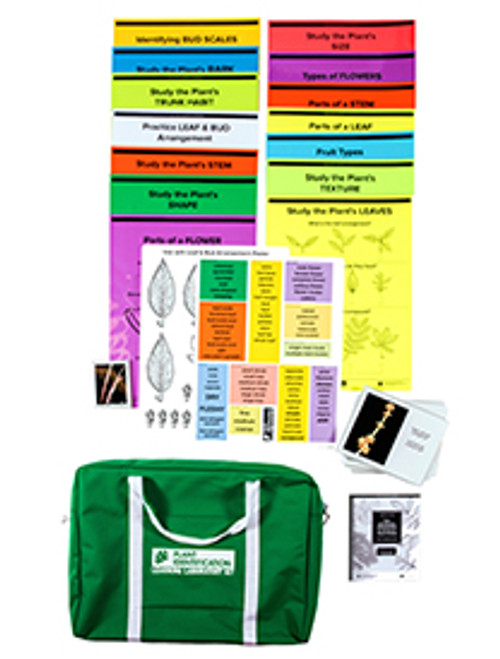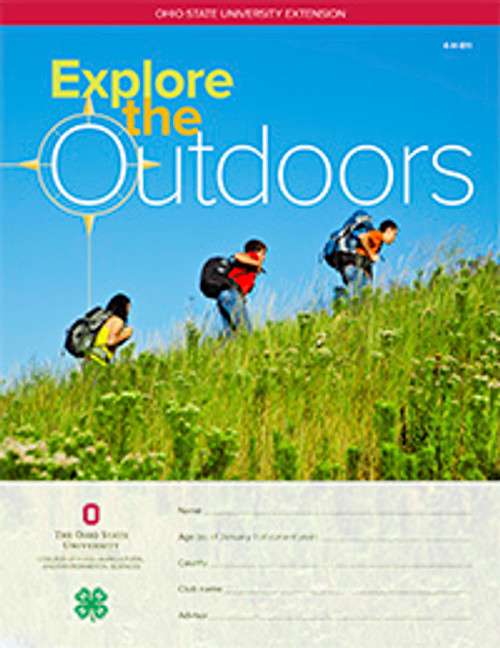↑ End Headings for tabs
Plant Identification Learning Lab Kit
The Plant Identification Learning Lab Kit is your answer for hands-on, durable learning materials that make learning tactile and fun. It includes materials suitable for learning the basic concepts and terminology used in the identification of deciduous trees and shrubs. It is intended as a generic reference. Specific species are not detailed. This kit includes materials and suggestions for activities that cover general characteristics, bark, stems, leaves, flowers, fruit, buds, and bud and leaf arrangement. Use for teaching and evaluating knowledge of landscaping. Perfect for classrooms, 4-H clubs, FFA chapters, skillathons, agricultural association activities, and more. Some assembly required.
↑ Stop tab content here
- Durable posters, pictures, charts, and task cards are printed on bright cover stock with heavy-duty lamination. Easy to write on and erase!
- Scored, color-coded, punch-out tags printed on durable polystyrene that come with fabric fasteners. No more painful cutting with scissors!
- Includes heavy-duty, plastic bags for ID tag storage and printed adhesive labels for easy organization.
- The Plant ID Characteristics for Deciduous Trees & Shrubs includes 12 lesson plans and print masters for most of the kit components. It is accompanied by a set of 42 color quiz cards.
- Each kit is shipped in a sturdy cardboard box that can be inserted into the canvas carrying case for durable kit storage and transportation.
- Kit is 26 x 20 x 6 inches and weighs approximately 17 pounds.
- NOTE: This kit is intended as a generic reference. Specific plant species are not detailed.
↑ Stop your tab content here
Learning Lab Kits were originally created for exploratory learning in grades 3-12. The hands-on activities provide information in a unique way that encourages youth to explore, reflect, and apply knowledge. Now, these kits are used in many settings—at county and state fair judging, in classrooms and after-school learning programs, and in agricultural association and group meetings.
Learning activities can include ideas like these:
- Hands-on introduction of agricultural, companion animal, and related topics through observing, communicating, organizing, comparing, relating, inferring, and applying knowledge and information.
- Learning stations that reinforce animal sciences and agricultural lessons on anatomy, conformation, breeds, equipment, plants. and plant parts, etc.
- Skillathon or quiz stations in which youth compete as they demonstrate their knowledge.
- Interactive team events that encourage youth to collaborate and cooperate.
- Exhibits and displays that help students start conversations and promote positive messaging about agriculture and animal science at public events.
↑ Stop your tab content here
Have pieces and parts of your learning lab kit gone missing? The fastest and most cost-effective way to replace lost parts is to use the Educator's Resource Materials Set that comes with each kit. It includes black and white images of the kit's components, from the small tags to the large posters, and everything in between. Whenever possible, images are actual size. Use the Educator's Resource Materials Set as your go-to source for replacement parts.
If you need in-color replacement parts or a large piece like a poster, replacement parts are available only through special order. Fill out the survey here to order replacement parts for your kit. One of our customer-service representatives will call you back with an estimate before you place your order.
↑ Stop your tab content here






